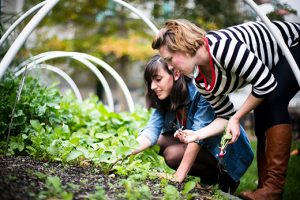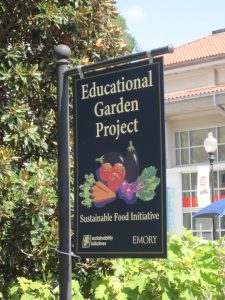As the colder weather and darker evenings draw in, look to the Emory Educational Gardens for a reminder that there is still plenty of fresh, seasonal produce available. And still plenty of opportunities to get outside, reconnect with the earth, and take a break from our screens! I spoke with Lauren Ladov, Educational Garden Project Coordinator, about the gardens here at Emory and how staff and faculty can get involved.
 Tell us about the Emory Educational Gardens and how they got started.
Tell us about the Emory Educational Gardens and how they got started.
The Emory Educational Gardens Project was started in 2007 by former biology professor, Chad Brommer. He noticed interest among students and faculty in having gardens on campus that would not only provide educational benefits but also health-related and aesthetic benefits. And thus began the long journey of proposing the idea and getting all of the necessary approvals. The Gardens Project exists as a program of the Office of Sustainability with Dr. Peggy Barlett, a professor in Anthropology with research in sustainable food and agriculture, as faculty guide, and me, Lauren Ladov, as the main program manager. There are eight gardens on Emory’s Atlanta Campus (at Cox Ravine, Eagle Row, the Candler School of Theology, Kaldi’s at The Depot, Rollins School of Public Health, the School of Nursing, and Clairmont Campus) and one at the Oxford Campus.
Who looks after the gardens?
Each garden is affiliated with a different program or school and cared for by a group of volunteer students, faculty, and staff. Anyone can volunteer to join one of these groups, regardless of their own departmental affiliation. Each week, groups host a open volunteer day to work on the garden together. Participants can also visit on their own time as they wish. Further care and overall guidance is managed by me, and, on occasion, an intern provided by the Office of Sustainability.
What happens to the food grown at the gardens?
The majority of the food goes to the volunteers themselves. If you grow it, you eat it! The garden at the Cox Ravine is affiliated with Emory Food Chain, a student-run organization focused on the reduction of food waste on Emory’s campus, and food grown there is sometimes incorporated into their programming. The Theology Garden often shares abundant harvests with their entire department, while the faculty lead at the Human Health garden (situated by Kaldi’s at the Depot) sometimes uses produce as a bonus incentive for her students. This past year, the Gardens Project started growing certain plants to donate to The Herb Bus, an Atlanta-based mobile clinic offering herbal healthcare to underserved populations.
As we enter the winter months, do you have any advice for budding gardeners looking for good, cold weather crops?
During the winter in Atlanta, you can still grow food. Hardy greens like collards, kale, and cabbages will all survive the chilly temperatures. Herbs like rosemary, oregano, chives, parsley, and cilantro do well too. The winter is also a great time to plant fruit trees and vines in your gardens, so they can grow strong roots for summer abundance. In the winter of 2017, the Gardens Project planted two fig trees, two muscadine grapevines, three blueberry bushes, three raspberry vines, one pomegranate tree, and lots of strawberries around campus, and we intend to plant even more this winter!
In your experience, what are the benefits to gardening and growing our own food?
Gardening and growing your own food can really open up a whole world of possibility. It can help you begin to reestablish a connection to the natural structures and rhythms of our environment, laying the groundwork for a compassionate relationship with the health of soils, waters, and all living beings. Growing your own food is such a basic life skill, yet one many are unfamiliar with. Re-establishing this knowledge is so empowering and fulfilling! It offers several wonderful opportunities for self-care, whether from the physical labor of gardening, the contact with the Earth, or the nutrition of freshly grown foods. And this self-care often evolves into the care of others, sharing the literal fruits of your labor with those around you.
My thanks to Lauren for sharing this information about our wonderful campus gardens! If you have questions about Emory’s Educational Gardens or would like to volunteer to help tend the gardens, contact Lauren Ladov (lauren [dot] eve [dot] ladov [at] emory [dot] edu) or gardens [at] emory [dot] edu.
Leave a Reply